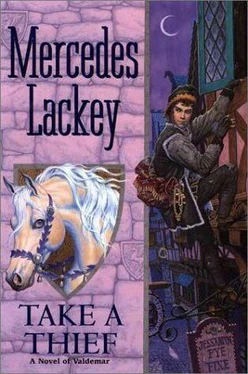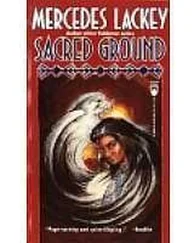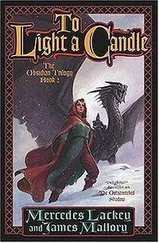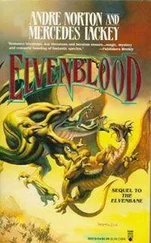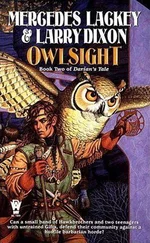Then, with an abrupt turn in the half dark, he darted into an opening in one wall and up a staircase. Skif followed, taking care where he put his feet, for there was plenty of debris on the rickety wooden stairs, some of it slippery. The stairs were steep, and switched back and forth, with landings on each floor that led to two or three closed doors.
At the top, however, there was only a single door, which Deek opened without knocking. Skif followed him inside, only to be confronted by a long hallway with more doors, lit from above by a single skylight with some translucent stuff in it that let in enough light to make out the doorways. Deek went straight to the end of the hall, much to Skif's bafflement. There was nothing there but the blank wall, an expanse of water-stained plaster with a couple of old, rusted hooks on it.
Deek paused at the end, and grinned back over his shoulder at Skif. “Figger it out, yet?” he taunted, then pulled on a hook.
A door separated itself from the cracked plaster, the lines of the door previously completely hidden in the cracks.
Deek motioned to Skif to go inside, and closed the door behind him. Now they went down a stair, more of a ladder than a staircase, one somehow sandwiched between the walls of buildings on all four sides; and in a moment, Skif realized that this must be an air shaft, and at some point someone had jury-rigged a stair inside it. There were windows looking into the shaft, but most of them had shutters over them to keep out the cold air. They climbed down and down until they passed through the bottom of the shaft, and Skif knew that they were below street level. If he hadn't already guessed that, the sudden increase in dampness would have given it away.
There was a door at the bottom of the stair; Deek knocked on this one in a definite pattern that Skif didn't quite catch. The door swung open, and Deek grabbed his arm and pulled him inside.
Another boy, this one older than Deek, with hair of a mousy blonde color, closed the door behind them. Skif stood at Deek's side, and took it all in without saying a word.
It was warm down here, warm and humid. The source of the warmth was a —
— copper wash boiler. Which was also the source of the moisture. It sat in a brickwork oven in the far corner of the stone-walled room, a chimney running up the corner behind it, with a fine fire burning beneath it, and presumably, laundry soaking in it. Hanging just below the ceiling were strings of drying wash.
Silk objects hung there, expensive silk, mostly scarves and handkerchiefs, a few veils, some lady's stockings and finely-knit silk gloves — and a few perfectly ordinary shirts and tunics and trews, stockings, all darned and patched.
Well, hey, if they're washin' the swag, they might's well wash their own stuff, I guess.
The fire beneath the cauldron, despite the name of “wash boiler” was not hot enough to boil the water, only to keep it warm. Next to the cauldron was a remarkable figure, seated on a stack of flat cushions, busily darning the heel of a silk stocking with fingers as fine and flexible as a woman's. He was bald, shiny-pated in fact, with enormous shoulders and chest muscles beneath a shabby tunic. The legs of his equally patched trews were folded under at the knee, as Deek had implied. He didn't look up from his work.
There were two more boys in the room, one stirring the laundry with a stick, the other cracking and peeling hard-boiled eggs at an old table with one broken leg propped up and crudely nailed to an old keg. Skif tried not to look at the eggs; his pilfered lunch had long since worn thin. Besides the table and the stool the boy sat on, of furnishings there were none. There were boxes in various states of repair, old kegs, half-barrels, and a wide variety of cushions, quilts, and other linens. Anything that was made of fabric, unlike the rest of the contents of the room, was neatly patched and darned and in good repair — and clean, very clean. There was plenty of light here, from a motley assortment of lamps and candles. And there was definitely one thing missing — the usual smell of poverty, compounded of dirt, mildew, grease, mouse, and sweat.
The man finished his darning and, with a gusty sigh, tossed the stocking in with the rest of the laundry in the wash boiler. Only then did he look up. His eyes, a startling black, seemed to bore right into Skif's brain.
“Where ye get this'un?” he asked Deek, turning his gaze on Skif's companion.
If Deek had possessed such a thing as a cap, he'd probably have snatched it off and held it diffidently in front of him in both hands. As it was, he ducked his head. “ 'E caught me, Bazie,” Deek told the man. “ 'E wuz in th' wash-house loft, an' 'e caught me cummin' in.” Then, having gotten the difficult bit over with — admitting that he'd been caught by a mere child, he continued with more enthusiasm, describing Skif's own “lay” and his wish to be taught. The other two boys pretended not to listen, but Skif caught them watching him surreptitiously.
“Figgered 'e cud take Larap's place, mebbe, if n 'e makes it past sixmun,” Deek concluded, looking hopefully at his mentor.
Now Bazie transferred his unwavering gaze to Skif. “Ye livin' rough?” he asked, and Skif knew that he'd better tell the truth.
“At Hollybush,” he replied shortly. “Kalchan's m'cuz, Londer's m'nuncle.”
Evidently Bazie knew the Hollybush, since he didn't ask where or what it was. His gaze became even more piercing. “Bonded?”
With relief Skif shook his head. “Nuh-uh!”; he denied vigorously. “Ma didn' bond me 'fore she croaked. Londer's pretty het 'bout it, but ain't nothin' 'e kin do now. An' 'e niver cud put me out, 'cuz 'e took me in, on th' rolls an all, reckonin' t' get me bonded.”
A bonded child was just short of property; required to serve in whatever capacity his “guardian” chose until he was sixteen, for the privilege of being sheltered and fed. Skif's mother had neglected (perhaps on purpose) to bond her toddler to her brother when her man left her and she fell ill — she worsened and died before Londer could get the bond signed and sworn to. It was too late now; no notary would swear to a faked bond. Well — no notary would swear to a faked bond for the pittance of a bribe that was all that Londer would offer.
By the point when Skif's mother died, Londer was already on record with the same Temple Beel served at as the responsible party for his sister and nephew (hoping to get Skif's bond). As such, he was technically required by law to care for Skif until the age of twelve without any benefit. At twelve, which was no more than a couple of years away, he could turn Skif out, but he probably wouldn't. Skif was still supplying free labor at no real cost to him, and as long as that was going on, Londer would let sleeping dogs lie.
Now, the fact was that although Skif was under no obligation to serve at the Hollybush for his keep, the only thing he could coerce out of Kalchan and Londer was a place to sleep. The food they offered him — the leavings from customers' meals — a pig wouldn't touch. If he wanted to eat, he had to either find alternate ways of getting meals (as he had) or do even more work than he already was. And as long as he wanted to sleep at the Hollybush, which though wretched, was infinitely better and safer than trying to find a place on the street, he had to obey Kalchan's orders whenever he was around the tavern. There were a lot of things that could happen to a child on the street — “living rough” — and most of them were far worse than being beaten now and again by Kalchan, who had no taste for little boys or girls.
'Course, if 'e thunk 'e cud get away wit' it, 'e'd hev no prollem sellin' me. Kalchan would sell his own mother's services if he thought he wouldn't get caught. As it was, on the rare occasions when Skif got dragooned into “helping,” he often had to endure the surreptitious caresses and whispered enticements of some of the customers who had wider ideas of pleasure than Kalchan did. As long as Kalchan didn't actually accept money in advance for the use of Skif's body, there was nothing that Skif could report to Temple or Guard.
Читать дальше
